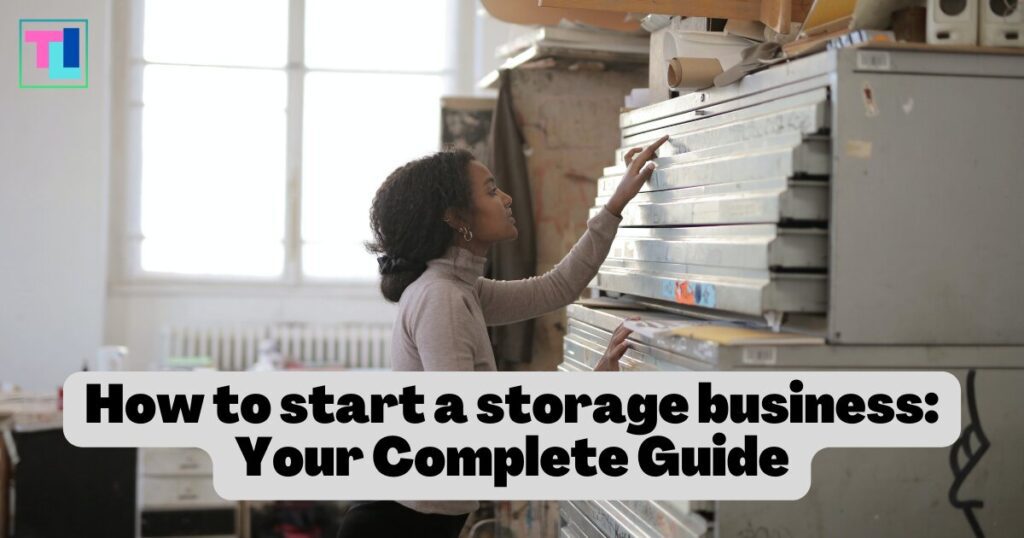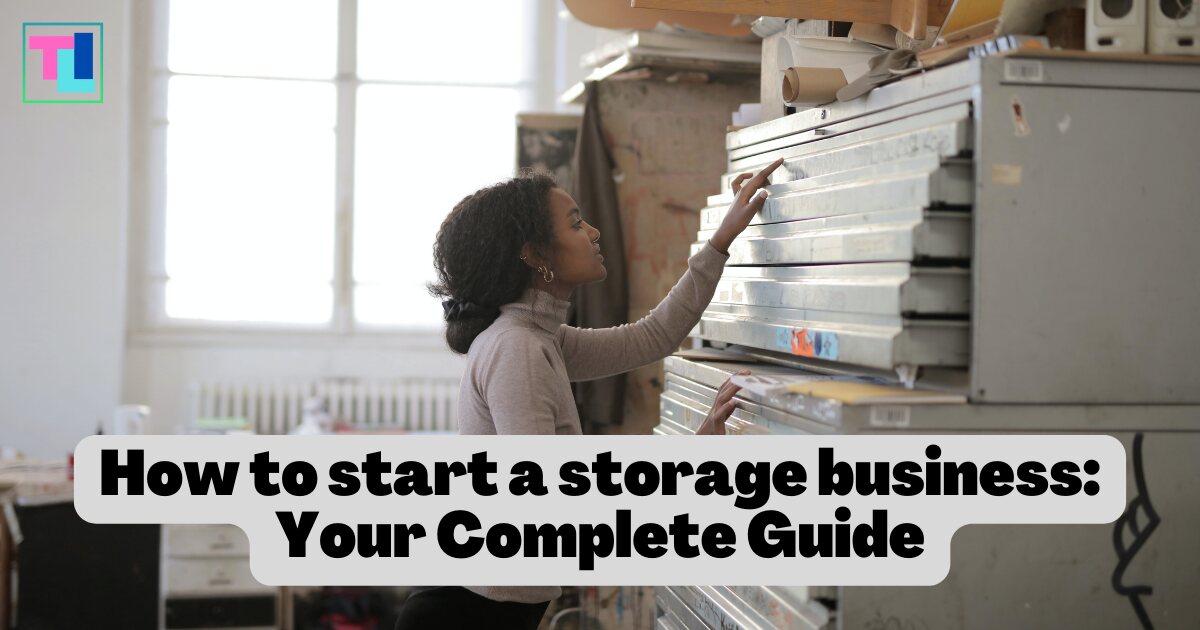
How to start a storage business: Your Complete Guide – Starting a storage business may be an interesting and rewarding undertaking. The storage sector is expanding, and there is a high need for accessible, safe, and economical storage options.
Before jumping into your own firm, it’s critical to undertake extensive market research to understand the industry, competitors, and client demands.
This article will provide you with a full overview of how to establish a storage business, including important information on market research, business strategy, finance, and more.
You may start a profitable storage business with the appropriate attitude and planning.
How to Start a Storage Business – Complete Guide
Let’s get started with the details, continue reading to learn more…
Conducting Market Research
Page Contents
Assess the local market’s demand for storage solutions: The first step in launching a storage business is conducting market research. The study should concentrate on comprehending local storage solution needs, including population density, economic developments, and market competitiveness.
Numerous techniques, such as internet research, questionnaires, and data analysis, can be used to get this information.
Analyze local economic trends and population growth: Analyzing population growth and regional economic trends is crucial to figuring out the need for storage solutions in the area. Government data, such as those published by the U.S. Census Bureau and the Bureau of Labor Statistics, can be used to determine this information.
Population growth may signal a rise in demand for storage solutions, while regional economic developments may reveal the market’s level of financial stability.
Read More>> How To Start A Loan Business: The Complete Guide (2023)
Assess the market’s level of competition: It is crucial to conduct market research on the local storage companies to establish the degree of competition. Reviewing the services provided, the costs incurred, and the degree of client satisfaction should all be included in this study.
Entrepreneurs may use this information to better analyze their competitors and decide what kinds of storage solutions to provide and what kinds of marketing techniques to employ.
Choosing Your Location
Importance of Accessibility and Visibility: The success of the storage company may be affected by several crucial factors, including its location. The optional site should be visible to potential clients and be simple access
This may be accomplished by picking a site that is visible from a busy street or one that is close to major roads and highways.
Consideration of Zoning Laws and Real Estate Prices: It is critical to consider zoning rules and real estate pricing when deciding on a location for a storage company. The sort of storage solutions that may be given can be influenced by zoning rules, while the cost of the initial investment can be influenced by real estate values.
Entrepreneurs should collaborate with local governments and real estate professionals to understand zoning restrictions and choose a location that matches their demands.
Analysis of Local Market Conditions: If you want to know if the neighborhood is a good fit for the storage company, you also need to consider accessibility and visibility.
Research on the regional economy, the demographics of the local people, and the kinds of companies operating there are all included in this. This data may be used to assess whether there is a need for storage solutions.
Developing a Business Plan
Outlining your goals and strategies: The first step in creating a business strategy is to list your objectives and plans of action. This entails taking into account the goals you have for your storage company, such as profitability, expansion, or client happiness.
You should also think about the precise actions you will take to accomplish your objectives, such as providing a specified number of storage spaces, expanding into new areas, or providing other services.
As a road map for the remainder of your planning process, this portion of your business plan should include a succinct and clear outline of your objectives and strategies.
Also, Read More>> How To Turn Off Business Account On Instagram: 5 Easy Steps (2023)
Detailing your target market and marketing strategies: The following stage is to describe your target market and marketing methods once you have stated your objectives and strategy. This entails figuring out who your prospective clients are and what storage requirements they have.
You may, for instance, target companies that want extra storage space for products, households that are relocating and require short-term storage, or people who are downsizing and require long-term storage.
You should also think about the exact marketing techniques you’ll employ to connect with your target audiences, such as specialized email marketing, web advertising, or word-of-mouth advertising.
The target market and marketing tactics you will use to reach and interact with your clients should be clearly and completely described in this area of your business plan.
Creating financial projections: Financial predictions are the last stage of business plan development. This entails forecasting your expected earnings, costs, and profitability over a predetermined time frame, usually several years.
This is a crucial phase in the fundraising process since it shows prospective investors or lenders that you are confident in the viability of your business and that you have a firm grasp of its financial components.
When making your financial estimates, you should take into account elements like the cost of rent, utilities, equipment, employees, and marketing.
This component of your business plan should offer a concise and accurate evaluation of your anticipated financial performance, assisting you in making decisions regarding the direction of your business.

Securing Funding
Options for funding startup costs: Finding money is a crucial first step in starting a storage business because it can be expensive to do so. Loans, grants, and investments are just a few of the ways to pay for starting expenses.
An effective business plan and a high credit score are often prerequisites for loans from banks, credit unions, or Internet lenders.
A competitive application procedure is often necessary for grants, a type of government money used for specified objectives like small company growth.
Investments from friends, relatives, or angel investors often include a share of the company’s ownership.
Importance of a Strong Financial Plan: A strong financial plan is essential for obtaining funding because it shows potential lenders and investors that you understand the financial elements of your firm and are confident in its potential for success.
A solid financial plan should contain predicted income, expenses, and profitability over a certain period, as well as a full study of your initial costs, which should include equipment, employees, and marketing costs.
It should also include your strategies for controlling cash flow, debt reduction, and profit maximization.
Must Read>> BitLife Business Update Guide: You Need To Know About Business Update (2023)
Consideration of loans, grants, and investments: It’s vital to assess the advantages and disadvantages of each funding source when deciding which is ideal for your particular business. Although they might have severe payback requirements and hefty interest rates, loans are a solid source of money.
If you are eligible, grants are a terrific choice, but it might be difficult to get funds. The chance for development and expansion is offered through investments, but they also include giving.

Choosing Your Storage Equipment
Determining the type and size of storage units to offer: It’s crucial to take into account the types and sizes of storage units you’ll provide when launching a storage business. Customers use storage facilities for a range of things, including storing everything from business equipment to their possessions.
Think about what kinds of storage—such as common storage units, climate-controlled apartments, parking for cars, or specialty spaces for boats and RVs—will satisfy the demands of your target market.
Consider the typical products that clients will store while choosing the size of the units, as well as the space you have available on your site.
Consideration of climate control and security features: Climate control and security elements should also be considered while selecting storage equipment. Customers that wish to store temperature-sensitive items such as electronics, antiques, and furniture can benefit from climate-controlled facilities.
Standard storage units, on the other hand, are a more affordable choice for consumers who do not want climate control. Alarms, video cameras, and secure locks are all necessary security elements to safeguard the safety of clients’ property.
Analysis of cost-effectiveness and customer demand: When choosing storage equipment, cost-effectiveness is critical. When making your selection, consider both the initial price of acquiring equipment and the continuing maintenance expenditures.
It’s also critical to research client demand for certain types of storage units, such as climate-controlled or specialty units, to ensure you’re providing the correct balance of alternatives to satisfy your customers’ demands.
Hiring Staff
Understanding your staffing needs: When launching a storage company, you must evaluate your workforce requirements. This involves determining the number of people you’ll need as well as the types of roles you’ll need to fill. You may need to recruit people for customer service, management, maintenance, and cleaning.
When evaluating your workforce requirements, keep in mind the hours of operation, the need for customer service, and the total workload.
Finding the right employees for customer service and management: Finding the best individuals is crucial when recruiting staff for management and customer service. Employees must be approachable, professional, and informed about your offerings since customer service is the face of your company.
Take into account employing organized, detail-oriented, and people with expertise in customer service. Seek applicants with business management expertise and good leadership qualities for management jobs.
Creating a plan for managing and training your staff: Once you’ve hired staff, it’s critical to have a strategy in place for managing and educating them. This entails establishing performance standards, writing job descriptions, and giving frequent feedback.
To make sure that your staff members are aware of your goods, services, and policies, it’s also crucial to offer training. Employees may stay current on the newest market trends and best practices with the aid of regular training sessions.
It will be easier to foster a healthy work atmosphere and ensure that your company runs smoothly if you have a well-thought-out plan for managing and training your workers.

Fixing Prices and Policies
Pricing depends on location, size, and competition: When pricing your storage units, it is critical to examine the market circumstances in your area. Location, size, and competition are all essential criteria that will influence the price you charge for your storage units.
You should look at similar firms in your region to get an idea of what the market will bear. You may also want to explore offering different sizes of storage units to fit a variety of consumer demands and budgets.
Developing payment terms, security procedures, and rental agreements: Creating payment terms and security protocols for your storage company is critical to ensuring that you can run your business effectively and efficiently.
You should draught rental agreements that are straightforward and simple to comprehend, describing the rental conditions, payment schedules, and security measures.
You will also want to make certain that you have adequate insurance coverage in place to safeguard your company and its clients.
Ensuring transparency and fairness for customers: It is critical to be upfront and fair with your clients when defining rates and policies for your storage business. This involves being open and honest about all prices, charges, and payment terms, as well as treating all customers fairly.
You may also think about introducing deals or discounts to attract new clients and keep existing ones.
Also, Enjoy To Read More>> How can google ads help you advance your business goals (2023)
Launching Your Business
Getting in touch with prospective consumers: Starting a storage business is exciting, so essential to get in touch with prospective clients to inform them of your business and the services you provide.
Advertising, social media, email marketing, and promotions are just a few of the marketing channels that may be used to accomplish that.
Organizing an open house or special promotion: Organizing an open house or special promotion is a terrific way to spread the word about your storage business and draw in new clients.
This may be a wonderful way to emphasize your products, show off your facilities, and give clients the chance to visit your spaces and ask questions.
Implementing your marketing strategy: It’s critical to carry out your marketing strategy after opening for business to attract new clients and advertise your storage units.
This might involve a combination of internet marketing strategies like email marketing and social media advertising, as well as more conventional advertising approaches like local print advertisements and direct mail.
The long-term success of your company depends on you continuously reviewing and revising your marketing strategy as necessary.
Monitoring and Evaluating Your Business
Financial performance: Monitoring financial performance and client happiness entails maintaining tabs on income, outgoing costs, and net profits to make sure your storage company is profitable and enduring.
This involves monitoring important performance metrics, including the occupancy rate, average rent, and turnover rate.
To learn what your consumers enjoy and dislike about your service and make modifications when necessary, it’s also critical to routinely analyze customer satisfaction through surveys, feedback, and complaints.
Identifying areas for improvement: You may uncover areas for improvement by frequently reviewing financial performance and customer happiness.
This might include alterations to price, marketing, or the storage units themselves. For example, you may need to provide larger storage units, provide climate control, or enhance security systems.
Continuously reviewing and adapting your strategies: The storage sector is a dynamic and ever-changing industry, and it’s critical to keep current with market and competitor developments.
Continuously assessing your plans will allow you to stay ahead of the game and make the required modifications to ensure your success.
Conclusion
Creating a business plan, acquiring financing, selecting storage equipment, hiring people, planning a marketing strategy, defining prices and policies, launching your company, and monitoring and analyzing it are all part of starting a storage business.
Starting a storage business is a significant undertaking that requires a lot of hard work and devotion to succeed. To make your business a success, you must be tenacious, adaptive, and willing to put in the time and effort.
Finally, you must have a detailed understanding of the storage sector and your target clientele, as well as a solid business plan and marketing strategy. You should also be willing to frequently assess and adjust your strategies as needed, as well as stay up with the market and competitive developments.
Don’t forget to leave a comment and share the article “How to start a storage business: Your Complete Guide“, because it may be very helpful for others.
Frequently Asked Questions (FAQs)
What are the key steps involved in starting a storage business?
Conducting market research, preparing a business plan, collecting money, selecting storage equipment, employing employees, designing a marketing strategy, establishing prices and policies, launching the firm, monitoring and analyzing performance, and continually making improvements as required are the major processes in beginning a storage business.
How do I determine the pricing for my storage units?
Pricing your storage units should consider various aspects, including your location, the size of the units you provide, and the competitors in your region. You should also evaluate the costs of running your business, such as rent, electricity, and employee pay, and attempt to set pricing that allows you to earn a profit while remaining competitive.
How can I ensure the success of my storage business?
To ensure the success of your storage business, conduct thorough market research, develop a comprehensive business plan, secure adequate funding, select the right storage equipment and hire the right staff, develop and implement a strong marketing strategy, set transparent and fair prices and policies, continuously monitor and evaluate your business performance, and make necessary adjustments to stay competitive and meet your customers’ needs. A strong commitment to hard work and dedication will also be essential to the success of your organization.
R Amin founded Try Latest Info, a website that provides readers with the latest information on business news, trends, and developments. He shares his insights and expertise through his social media handles and website. To learn more about R Amin or to connect with him on social media, please visit his website at https://trylatestinfo.com/.
